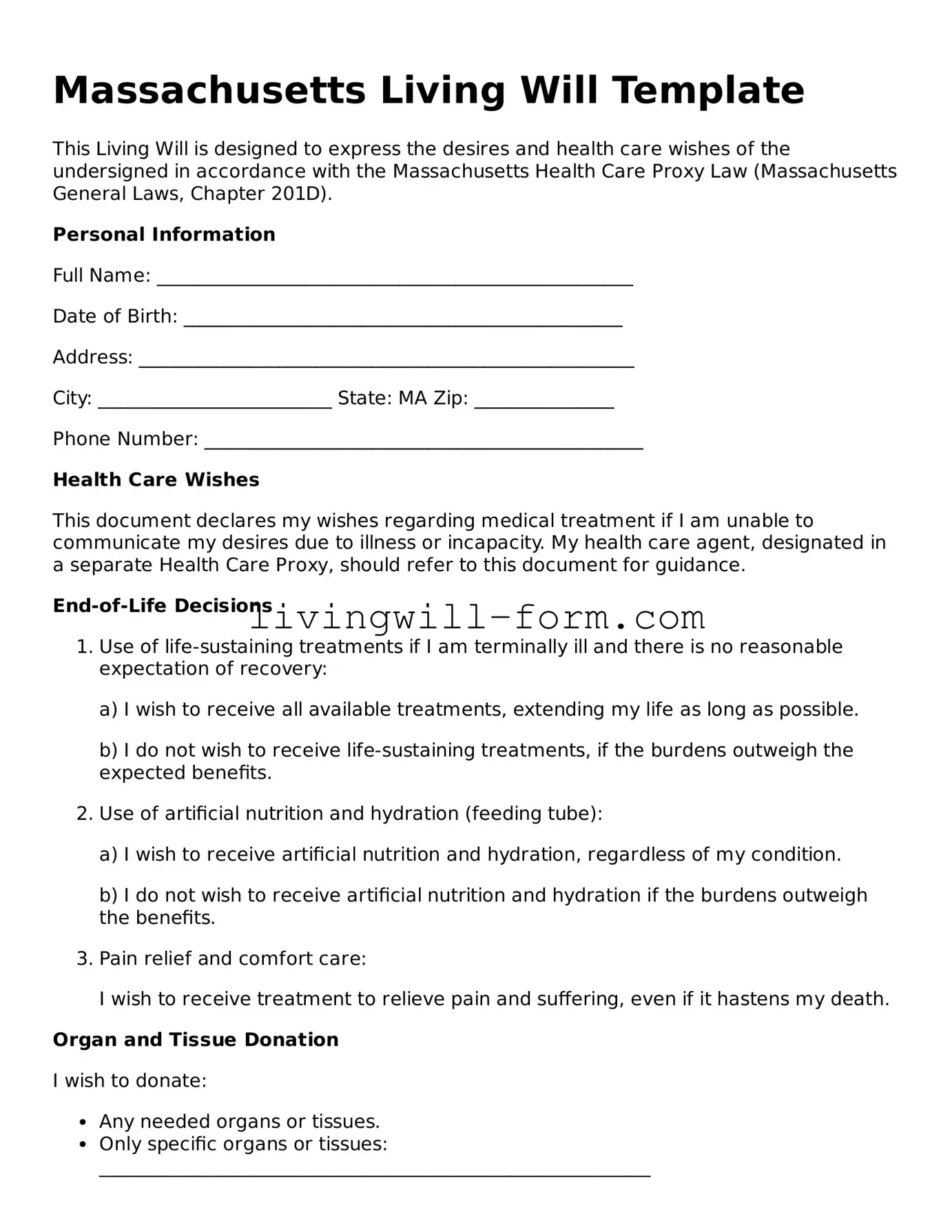What is a Massachusetts Living Will?
A Massachusetts Living Will is a legal document that allows an individual to outline their preferences for medical treatment in situations where they are unable to communicate their decisions due to incapacity or terminal illness. It specifies which life-sustaining treatments, if any, they wish to decline or receive.
Is a Living Will legally binding in Massachusetts?
Massachusetts does not have a statute that explicitly recognizes Living Wills as legally binding. However, the state’s highest court has acknowledged the right of a competent adult to refuse medical treatment. Consequently, a Living Will can be considered as part of expressing an individual’s health care wishes, together with Health Care Proxy documentation.
How does a Living Will differ from a Health Care Proxy in Massachusetts?
A Living Will focuses on specifying an individual’s preferences for end-of-life care and medical treatments. A Health Care Proxy, on the other hand, designates another person (proxy) to make health care decisions on behalf of the individual should they become incapacitated. While a Living Will provides important guidance, the Health Care Proxy holds the legal authority to make decisions in Massachusetts.
What should be included in a Massachusetts Living Will?
A Massachusetts Living Will should include detailed instructions on the person’s preferences regarding life-sustaining treatment, such as mechanical ventilation, artificial nutrition and hydration, resuscitation, and other end-of-life care options. It’s also recommended to include information about pain management and any treatments the individual would like to refuse.
Do I need a lawyer to create a Living Will in Massachusetts?
While it is not a legal requirement to have a lawyer to create a Living Will in Massachusetts, consulting with a legal professional can be beneficial. They can ensure that your health care wishes are clearly articulated and that your document is consistent with Massachusetts law and other relevant legal documents, like a Health Care Proxy.
How can I ensure that my Living Will is followed in Massachusetts?
First, ensure that your Living Will and any Health Care Proxy forms are completed accurately and reflect your current wishes. Discuss your health care preferences with your designated Health Care Proxy and provide copies of your Living Will to them, as well as your healthcare providers and family members. Regularly review and update your documents as necessary to ensure they remain reflective of your wishes.
Can I change or revoke my Massachusetts Living Will?
Yes, you can change or revoke your Massachusetts Living Will at any time as long as you are considered mentally competent. To do so, you should communicate your intentions clearly, destroy the existing document, notify anyone who has a copy of the changes, and create a new document reflecting your updated wishes.
What happens if I don’t have a Living Will and become incapacitated in Massachusetts?
If you become incapacitated without a Living Will or a Health Care Proxy in place, Massachusetts law allows for a family member or close friend to become a de facto health care decision-maker. However, decisions made by this person may not necessarily align with your own wishes, which is why having a Living Will and Health Carrier Proxy is highly encouraged.
Is it necessary to notarize a Living Will in Massachusetts?
Massachusetts law does not require a Living Will to be notarized. However, it is crucial to have the document witnessed by two individuals who can attest to the signer's competence and voluntary sign-up. Ensuring the document is properly witnessed adds a layer of validity to the Living Will, although notarization may add an additional layer of formality and protection.
Where should I store my Massachusetts Living Will?
Keep your original Living Will in a safe, yet easily accessible place. Inform your Health Care Proxy, family, and friends where it is stored. It’s also advisable to give copies to your Health Care Proxy, primary healthcare provider, and anyone else who might be involved in your health care decision-making process.

